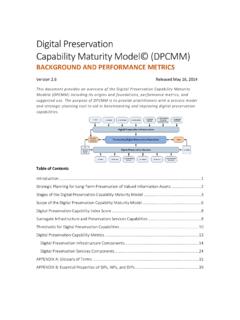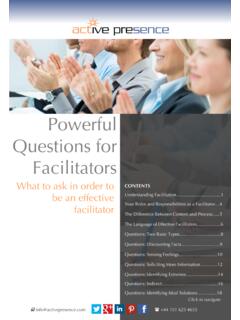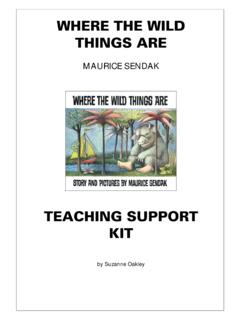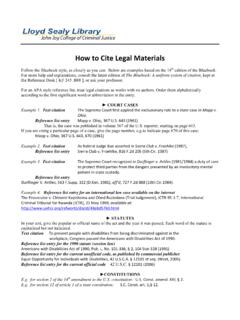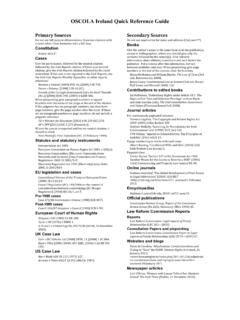Transcription of Powerful Questions for Facilitators
1 +44 151 625 4655 CONTENTS Understanding Click to navigate Your Roles and Responsibilities as a The Difference Between Content and The Language of Effective Questions : Two Basic Questions : Discovering Questions : Sensing Questions : Soliciting More Questions : Identifying Powerful Questions for Facilitators What to ask in order to be an effective facilitator Questions : Questions : Identifying Ideal Created by: Active Presence Limited Wirral CH48 3JJ UK +44 151 625 4655 Registered in England, company number: 4588126 VAT No: GB 854 2129 33 Copyright 2013 Active Presence Limited reference is made to Successful Speaking Secrets quick reference Written by Chris Davidson Published in 2010 ISBN 9780955604126 Available from Active Presence Limited Distribution date of this version: August 2013 All rights reserved.
2 No part of this publication may be transmitted in any form or by any means electronic or mechanical, including photocopying, recording, or any storage and retrieval system, without prior permission in writing from the publisher 3 Understanding Facilitation In many organisations across the business spectrum, people are discovering the benefits of using a neutral third party to oversee and improve meetings. In the business world, the hybrid and vital role of facilitator has emerged. What does a facilitator do? A facilitator: manages the meeting gives participants the relevant structure and tools makes sure everyone is heard helps participants identify their goals helps participants to develop their action plans provides leadership helps others assume responsibility and take charge themselves A facilitator does not: take part in the discussion try to influence the outcome offer their own view make decisions take control of the content Examples of where facilitation skills can be useful.
3 A strategic planning session a session to clarify objectives and create detailed results indicators a priority-setting meeting a team-building session a program review/evaluation session a communication/liaison meeting a meeting to negotiate team roles and responsibilities a problem-solving meeting a meeting to share feedback and improve performance a focus group to gather input on a new program or product Active Presence, 2013 4 Your Roles and Responsibilities as a Facilitator As a facilitator you can make a huge and varied contribution to an organisation.
4 You can help group members define their overall aim, as well as specific objectives and goals You can instruct members on how to assess needs and create plans to fulfil them You will possess the correct knowledge of processes and skills needed to help participants become time effective and make high-quality decisions You can provide feedback to the group, so that they can measure their progress and make adjustments where needed You will emphasise the importance of communicating effectively, and ensure members know how to do this Your aim will be to create a positive environment where employees can work productively and reach shared group goals You will aim to manage conflict by implementing a collaborative approach You can pass on your skills through teaching and empowering.
5 So that members of the group will have a good idea of the art of facilitation You can offer support and advice to members in managing their own personal dynamics You will help participants assess the skills they already possess and advise them on how to acquire new ones. Active Presence, 2013 5 The Difference Between Content and Process To be a successful facilitator, you need to be clear a about the difference between content and process. Content means the subjects being discussed, and the tasks at hand. Content is expressed through the agenda and consumes most of the attention of the participants.
6 Process is the way in which the content is discussed; this should include things such as the style of interaction, the group dynamics and the climate that has been established. It is your job as the facilitator to manage the process and leave the content to the participants. Content Process What? How? The subjects for discussion The methods and procedures The task How relations are maintained The problems being solved The tools being used The decisions made The rules or norms set The agenda terms The group dynamics The goals The climate Active Presence, 2013 6 The Language of Effective Facilitators When you act as a facilitator, you need to remain a neutral force for the whole time you are in control.
7 There are four main language techniques that can help you focus on process and not influence content: Paraphrasing Feeling identification Insight clarification Observations of participant s conduct The most important thing is that you must not sound judgemental or critical. Paraphrasing Involves describing, in your own words, what another person s remarks convey: Do I understand you correctly Are you What I m hearing you say You need to be paraphrasing continuously throughout. It is a very useful way of dealing with potential conflicts and clarifying peoples opinions.
8 You will put members at ease by paraphrasing, simply because it shows their opinions are being heard and acknowledged. Identifying feelings This generally consists of specifying and identifying a feeling either by naming, using a metaphor or using a figure of speech. I feel we ve run out of energy (Naming) I feel as if we re facing a brick wall (Metaphor) I feel like a fly on the wall (Figure of speech) As a facilitator, you need to be in tune with how you re feeling and be more than willing to share those feelings with the group. Honesty is definitely the best policy.
9 Revealing your feelings encourages others to share their own. Clarifying insight This is describing what you perceive to be another person s inner state, to check if you understand what he or she is feeling. You appear upset by the last comment that was made. Are you? You seem impatient. Are you anxious to move on to the next topic? Active Presence, 2013 7 Insight clarification lets you take the pulse of participants who may be experiencing emotions that get in the way of their participation. It also encourages a participant to share an opinion that they, initially, were not going to voice within the discussion group.
10 Observer conduct This involves relating back to the participants what you have been able to observe about their behaviours, without making accusations or generalisations about them as people, or attributing motives to them, I m noticing that we ve only heard from this group of people throughout most of this discussion I m noticing that several people are working on their emails By describing specific behaviours, you give participants information about how their actions are being perceived. Feeding this information back to the participants in a non-threatening manner opens the door for individuals to suggest actions to improve the existing situation.

